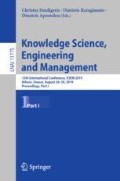Abstract
Traffic flow prediction is an interesting and challenging problem in transportation modeling and management. The complex topological structure of urban road network makes it more complicated. The performance of traditional traffic flow prediction models like time series models is not satisfactory, for those methods cannot describe the complicated nonlinearity and uncertainty of the traffic flow precisely. With the rapid development of deep learning, many researchers try to apply deep learning methods to traffic flow prediction. However, those deep learning models neither consider both spatial relation and temporal relation, nor do they combine spatial relation and temporal relation in an effective way. In this paper, we propose a deep urban traffic flow prediction framework (DST) based on spatial-temporal features. In our framework, we use a local convolutional neural network (CNN) method which only considers spatially nearby regions to extract the spatial features and a long short-term memory (LSTM) model to extract the temporal features. In addtion to the traffic flow data, we also use external context data when predicting traffic flow. The experiments on a large-scale taxi trajectory dataset TaxiCQ show that our proposed model significantly outperforms other comparison models.
Access this chapter
Tax calculation will be finalised at checkout
Purchases are for personal use only
References
Zheng, Y., Mascolo, C., Silva, C.T.: Guest editorial: urban computing. IEEE Trans. Big Data 3(2), 124–125 (2017)
Zheng, Y.: Urban computing: enabling urban intelligence with big data. Frontiers Comput. Sci. 11(1), 1–3 (2017)
Yuankai, W., Tan, H., Qin, L., Ran, B., Jiang, Z.: A hybrid deep learning based traffic flow prediction method and its understanding. Transp. Res. Part C Emerg. Technol. 90, 166–180 (2018)
Guo, Y., Lu, L.: Application of a traffic flow prediction model based on neural network in intelligent vehicle management. Int. J. Pattern Recogn. Artif. Intell. (2018)
Mackenzie, J., Roddick, J.F., Zito, R.: An evaluation of HTM and LSTM for short-term arterial traffic flow prediction. IEEE Trans. Intell. Transp. Syst. 99, 1–11 (2018)
Kamarianakis, Y., Vouton, V.: Forecasting traffic flow conditions in an urban network: comparison of multivariate and univariate approaches. Transp. Res. Rec. 1857(1), 74–84 (2003)
Williams, B.M., Hoel, L.A.: Modeling and forecasting vehicular traffic flow as a seasonal arima process: theoretical basis and empirical results. J. Transp. Eng. 129(6), 664–672 (2003)
Jin, X., Zhang, Y., Yao, D.: Simultaneously prediction of network traffic flow based on PCA-SVR. In: Liu, D., Fei, S., Hou, Z., Zhang, H., Sun, C. (eds.) ISNN 2007. LNCS, vol. 4492, pp. 1022–1031. Springer, Heidelberg (2007). https://doi.org/10.1007/978-3-540-72393-6_121
Leshem, G., Ritov, Y.: Traffic flow prediction using adaboost algorithm with random forests as a weak learner. In: Proceedings of World Academy of Science, Engineering and Technology, vol. 19, pp. 193–198 (2007)
Huang, W., Song, G., Hong, H., Xie, K.: Deep architecture for traffic flow prediction: deep belief networks with multitask learning. IEEE Trans. Intell. Transp. Syst. 15(5), 2191–2201 (2014)
Lv, Y., Duan, Y., Kang, W., Li, Z., Wang, F.Y.: Traffic flow prediction with big data: a deep learning approach. IEEE Trans. Intell. Transp. Syst. 16(2), 865–873 (2015)
Polson, N.G., Sokolov, V.O.: Deep learning for short-term traffic flow prediction. Transp. Res. Part C Emerg. Technol. 79, 1–17 (2017)
Wang, J., Hu, F., Li, L.: Deep bi-directional long short-term memory model for short-term traffic flow prediction. In: Liu, D., Xie, S., Li, Y., Zhao, D., El-Alfy, E.-S.M. (eds.) ICONIP 2017. LNCS, vol. 10638, pp. 306–316. Springer, Cham (2017). https://doi.org/10.1007/978-3-319-70139-4_31
Zhang, J., Zheng, Y., Qi, D.: Deep spatio-temporal residual networks for citywide crowd flows prediction. In: AAAI, pp. 1655–1661 (2017)
Yao, H., et al.: Deep multi-view spatial-temporal network for taxi demand prediction. In: 2018 AAAI Conference on Artificial Intelligence (AAAI 2018) (2018)
Liang, Y., Ke, S., Zhang, J., Yi, X., Zheng, Y.: GeoMAN: multi-level attention networks for geo-sensory time series prediction. In: IJCAI, pp. 3428–3434 (2018)
Hochreiter, S., Schmidhuber, J.: Long short-term memory. Neural Comput. 9(8), 1735–1780 (1997)
Koesdwiady, A., Soua, R., Karray, F.: Improving traffic flow prediction with weather information in connected cars: a deep learning approach. IEEE Trans. Veh. Technol. 65(12), 9508–9517 (2016)
Acknowledgement
This work was supported by NSFC (grant No. 61877051) and CSTC (grant No. cstc2018jscx-msyb1042, cstc2017zdcy-zdyf0366).
Author information
Authors and Affiliations
Corresponding author
Editor information
Editors and Affiliations
Rights and permissions
Copyright information
© 2019 Springer Nature Switzerland AG
About this paper
Cite this paper
Wang, J., Cao, Y., Du, Y., Li, L. (2019). DST: A Deep Urban Traffic Flow Prediction Framework Based on Spatial-Temporal Features. In: Douligeris, C., Karagiannis, D., Apostolou, D. (eds) Knowledge Science, Engineering and Management. KSEM 2019. Lecture Notes in Computer Science(), vol 11775. Springer, Cham. https://doi.org/10.1007/978-3-030-29551-6_37
Download citation
DOI: https://doi.org/10.1007/978-3-030-29551-6_37
Published:
Publisher Name: Springer, Cham
Print ISBN: 978-3-030-29550-9
Online ISBN: 978-3-030-29551-6
eBook Packages: Computer ScienceComputer Science (R0)

